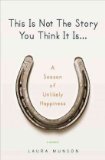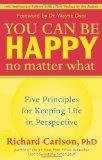Review of This Is Not the Story You Think It Is…
This Is Not the Story You Think It Is…
 A Season of Unlikely Happiness
A Season of Unlikely Happiness
by Laura Munson
Amy Einhorn Books (Penguin), New York, 2010. 343 pages.
Starred Review
2010 Sonderbooks Stand-out: #1 True Stories
I read this book months ago, but put off reviewing it because it was not a library book (and therefore wasn’t due back) and I hardly knew where to begin. However, now I’m trying to catch up and get reviews for all of my 2010 Sonderbooks Stand-outs posted — and this was easily the nonfiction book that most stood out in my mind this year.
A year or two before, I’d read an e-mail that had been circulating with an essay by Laura Munson, and I’d been touched and impressed. It told how her husband had informed her that he didn’t love her any more, and wanted out. But she didn’t buy it. And she chose not to suffer. They went through a summer where he sometimes came around and sometimes didn’t. And in the end, he came back to her and realized how much she and the family meant to him.
When I discovered she had expanded the story into a book, I ordered it from Amazon as soon as possible. I was not disappointed. All the wisdom of the original essay was there, with much more background. The book is powerful. I’m strongly recommending it to anyone whose husband is going through anything remotely like a midlife crisis. Or anyone who has heard those awful words, “I don’t think I ever really loved you.”
Laura Munson wrote this book as a journal during her crisis. It comforts me that she let out some of her frustration to the journal! However, I can see that she’s also talking herself into being rational. She has chosen not to suffer, and she’s helping herself stick with that choice by writing out her reasoning. Here’s a section from the first chapter:
“At this moment in my life, I am not sure where my husband is. He left last night to bring the trash to the dump after announcing that he’s not sure he loves me anymore, and hasn’t come home. He isn’t answering his cell phone. He isn’t responding to texts.
“But I don’t buy it. The part about him not loving me. As much as it’s devastating to hear, I believe there’s more to the story. I believe he’s in a state of personal crisis. I believe this is about him.
“I’m going to give you a challenge here. I’m going to give both you and me a challenge here. Let’s try in all this not to take sides. Because how does it feel to take sides? Do we get to be right? Self-righteous? I think there’s more suffering in self-righteousness than most of us are willing to fathom.
“I see it like this: we all have our seasons of personal woe. I’ve certainly had mine. I know how much he hates his job, how much he punishes himself for not making enough money and not knowing where to go next with his career; how stuck and desperate he feels, especially in our small mountain town where the high-paying jobs are NOT plentiful. I know that he’s suffering intensely. I know because I’ve been there. I feel his pain and I’ve told him so.
“But he’s not hearing my voice. His own is too thunderous. He has to come to the end of it by himself…. And I know it’s more helpful to practice empathy here. Not anger. Or fear. Even though his words were like sharp sleet.
“It’s like when teenagers scream ‘I hate you’ and slam the door in their parents’ face. Does that ‘I hate you’ have credibility? Or does the parent know instinctually that something upsetting happened at school? That it’s not about the parent at all? I’m not saying that my husband is acting like a teenager. (Or, God forbid, that I’m his parent!) I’m just saying that I think there’s more to the story.”
She writes on about all her personal struggles with this. It’s not coming easy for her, and if she pretended it had, this book would have lost its power. I like this part, later in that first chapter:
“Now, I know, dear reader, there’s a strong possibility that you’ve got your hackles up. You want to tell me I’m being a fool to put up with this unacceptable behavior. You want me to fight….
“But I’m opting for a different strategy, and I’m going to believe it will work in a way that fighting, persuading, and demanding never have. Because whether or not he comes back to me, I will be ultimately empowered by my commitment not to suffer. It’s a way of life. A way to life. And it’s about many and no religions. Plug it in wherever it meets your life. We all want to be free, don’t we?
“And yes — this strategy is new to me, too. I’m sure it’ll be shaky at times. But I’m going for it. And I’m going to write my way through it. Both for my process. And for yours. For anyone in any situation in which one is tempted to go into panic mode, or worse, victim mode, rather than taking responsibility for one’s own well-being.”
She goes on and takes us through the next several months, as well as giving us the background of their marriage and life, and her own recent crises. She has some setbacks. But mostly she handles some awful situations with incredible grace. I love the scene where they have a “talk.” Because she responds brilliantly. She keeps asking the question (which she has practiced with her therapist), “What can we do to give you the distance you need without damaging our family?”
When he answers that he can get his own place in town, she asks him, “What would that look like?” And she talks to him. By asking questions, she gets him to realize that he hasn’t thought this through. Her conversation is brilliant and wise — and I love how she puts in italics what she would have really liked to say! He insults her and accuses her, but they work out that he will look into a studio apartment over the garage and still stay with the family.
As I was reading this book, I started feeling sad that I hadn’t come across it when my husband’s crisis started. That I did not react so beautifully and calmly. But you know what? I was comforted somewhat when, despite her wise and loving reactions, her husband did awful things and blamed her.
She said something perfectly reasonable: “Our son looked out the window this morning and said, ‘Oh look. Dad’s truck is in the driveway.’ And I didn’t like that to be a surprise — for him or for me.” His response is not even close to reasonable. He swears at her, slams the door, and sleeps in another room. She says:
“Here’s what inspires me to fall to sleep finally: he heard those words. He reacted like a child. He knows it. I didn’t say or do anything wrong. He got triggered by the truth. He doesn’t want to be who he’s being. His anger is real and it’s scary, but it’s anger toward himself. It’s not my fault.
“And here’s what I am convinced of. In fact, I think it’s the key to a relationship. Any relationship.
“If you get out of someone’s way, they will fight and they will kick, but eventually, there’s nothing they can do but look at themselves and get real. Very, very real. Or totally self-combust in a life of lies. Or that dear opiate, denial.”
What encouraged me about this was that even when she was reacting so well, her husband acted just like other men in midlife crisis. A light dawned in my brain. It really is all about him.
Mind you, I am sure that Laura Munson saved herself excruciating hours upon hours of suffering. But I don’t think that it was necessarily her good reactions that saved her marriage. If her husband had another woman who was egging him on, who knows what might have happened. Here’s another insight about the treatment she was given:
“All abuse is just bait. To get you to the be one who freaks out. So the other person doesn’t have to deal. Doesn’t have to take responsibility. Oh look — she’s the one with the black eye. She’s the one crying in the corner. She’s the one leaving. What a bitch.”
Later on, in another incident where her husband yells at her, she says what she would like to say, and then reflects:
“But I stay silent and practice not taking the bait — not being resentful. Letting it wash over me. Because when I stay here I am powerful. Very, very powerful. Take note of this. Let him have the middle-aged tantrum. Just be sure to duck!”
It’s about him. It’s about him. This was so much easier to see in someone else’s story than in my own! And it helped to see that just because your husband yells at you does not necessarily mean that you deserve it. It also helped to see that even when treated badly, a wife can remember that this is a man she loves.
And they get through it. By the end of the summer, her husband was back in their home, spontaneously telling her that he loved her. I’m not sure if Laura Munson realizes that a midlife crisis only three months long is a minor miracle all by itself, and that it could have gone much, much worse. But I am sure that even if the situation had lasted years instead of months, she would have handled it with grace, and she would have continued to choose not to suffer.
In the beginning, Laura Munson tells about her Author’s Statement taped above her desk.
“It says: ‘I write to shine a light on an otherwise dim or even pitch-black corner, to provide relief for myself and others.’
“That’s what this book is all about. Maybe it will help people. Maybe even save marriages, and jobs, and children’s hearts from breaking. I wish I had this book on my bedside table right now. If only just to know that I am not alone.
“If my husband and I come out the other side, together, in love, still married, and unsuffering, then this summer will have been worth it. This book will be worth it.
“And even if we don’t, then I know I will be a better person for living this way.
“So stay with me. Like a gentle friend. Maybe we will both learn something that will change our lives. I’m willing to try. On our behalf.”
Take it from me: Laura Munson succeeds beautifully in her goals. She inspires you to keep going, whatever the outcome of your husband’s crisis. She reminds you that suffering simply isn’t worth it. You can love him, but you don’t have to take the bait.
Find this review on Sonderbooks at: www.sonderbooks.com/Nonfiction/not_the_story.html
Disclosure: I am an Amazon Affiliate, and will earn a small percentage if you order a book on Amazon after clicking through from my site.
Source: This review is based on a book I purchased from Amazon.com.








